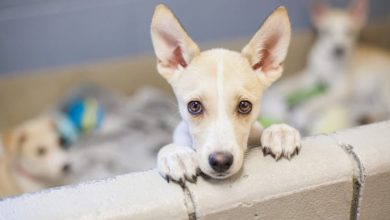Canine Conundrum: The Dangers of a Dog Eating a Squirrel

What Happens If a Dog Eats a Squirrel?
Introduction
Dogs are naturally curious creatures, and they often explore their environment by sniffing, tasting and even eating things that catch their attention. While this behavior is not always dangerous, there are some situations in which it can be highly risky. One such situation is when a dog eats a squirrel. While it may seem like an unlikely occurrence, it’s not as rare as you might think – especially if you have an outdoor dog or one that likes to explore. In this article, we’ll discuss what happens if a dog eats a squirrel and how to prevent it from happening in the first place.
What Can Happen if a Dog Eats a Squirrel?
The most common risk associated with dogs eating squirrels is gastrointestinal upset. This can range from mild vomiting and diarrhea to more serious issues such as pancreatitis or an intestinal blockage. Dogs may also suffer from neurological symptoms if they eat squirrels that have been exposed to certain toxins or parasites. These can include seizures, tremors, muscle weakness and even death in extreme cases.
Potential Risks of Eating a Squirrel
There are several potential risks associated with dogs eating squirrels. Firstly, the animal could be infected with parasites such as roundworms or tapeworms which can be passed on to the dog if ingested. In addition, some wild animals carry diseases which can be transmitted through contact with saliva or feces – meaning that eating the animal could put your pet at risk of infection too. Lastly, there is the potential for toxic substances to be present in the animal’s body due to environmental contamination or other factors – these too could be passed on to your pet if eaten.
Symptoms to Look Out For After Your Dog Has Eaten a Squirrel
If your dog has eaten a squirrel then it’s important to keep an eye out for any signs of distress or illness that may develop over time. Common symptoms include vomiting, diarrhea, lethargy, loss of appetite and abdominal pain/discomfort. It’s also important to watch out for any neurological symptoms such as seizures or tremors which could indicate exposure to toxins or parasites present in the animal’s body prior to consumption.
Treatment Options for Dogs That Have Eaten a Squirrel
If you suspect that your pet has eaten a squirrel then it’s important to seek veterinary attention immediately in order to determine the best course of treatment for your pet’s specific needs. Treatment options will depend on the type of symptoms being displayed by your pet but may include antibiotics (to treat infection), anti-nausea medications (to ease vomiting) and even surgery (in cases where there is an intestinal blockage).
Prevention Measures To Stop Your Dog From Eating A Squirrel
The best way to prevent your dog from eating a squirrel is by keeping them away from areas where wild animals are known to live – this includes wooded areas and parks where these animals are likely found during certain times of year (especially during mating season). It’s also important not to leave food out where wild animals can access it as this could attract them into your garden and potentially increase the chances of them coming into contact with your pet while looking for food sources. Finally, always supervise your pet when they are outdoors so you can intervene quickly should they attempt to consume something they shouldn’t!
What Do Veterinarians Say About Dogs Eating Squirrels?
Veterinarians generally advise against allowing dogs to eat wild animals such as squirrels due to the potential health risks involved (as discussed above). However, if you do notice any signs of illness after your pet has consumed one then it is important that you seek veterinary attention immediately in order ensure prompt diagnosis and treatment before any further complications arise!
Conclusion
.
It is never recommended that dogs eat wild animals such as squirrels due to the potential health risks involved including gastrointestinal upset, neurological symptoms and even death in extreme cases! If you suspect that your pet has consumed one then seek veterinary attention immediately so appropriate treatment can begin promptly – prevention measures should also be taken in order reduce chances of future incidents occurring!
FAQS
.Q: What happens if my dog eats a squirrel?
A: The most common risk associated with dogs eating squirrels is gastrointestinal upset ranging from mild vomiting and diarrhea up more serious issues such as pancreatitis or an intestinal blockage – neurological symptoms may also occur depending on whether the animal had been exposed toxins/parasites prior consumption!

